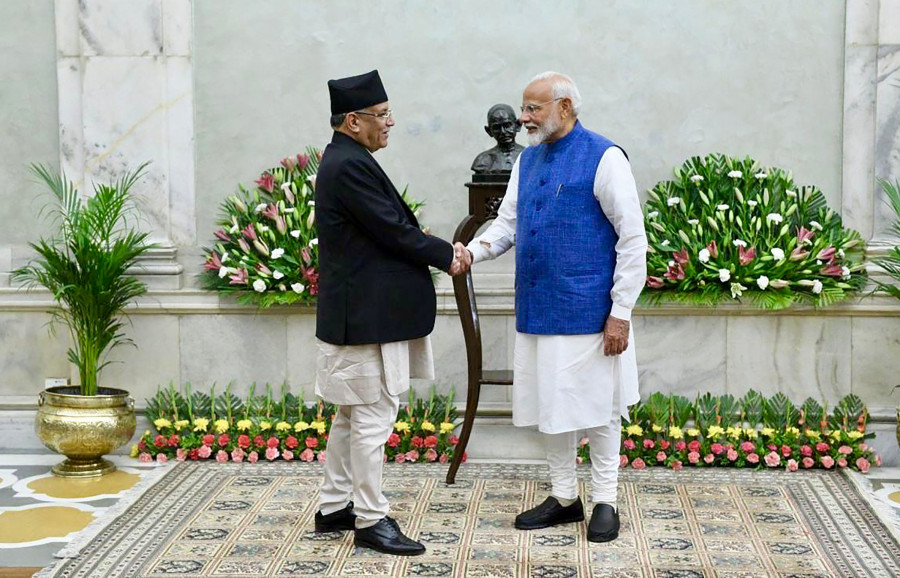National
Modi 3.0 won’t bring much change in India’s Nepal policy: Ex-envoy Saran
Speaking at an event in Kathmandu, the former Indian ambassador to Nepal did not criticise Modi’s foreign policy but was cautious with his views.
Post Report
Former Indian foreign secretary and ambassador to Nepal Shyam Saran has said that India’s Nepal policy is unlikely to change during the third term of Indian Prime Minister Narendra Modi.
Saran, who was in Kathmandu to attend a regional conference organised by ICIMOD, is one of the key architects of India’s Nepal policy after the political changes of 2005–2006 in Kathmandu.
Speaking at an interaction organised by Centre for Social Innovation and Foreign Policy (CSIF), a private research centre, on Monday, the veteran Indian diplomat also reviewed the India’s policy towards Nepal in the past decade; impacts and constraints of India’s ‘Neighborhood First’ policy; and what India can do in the future to overcome those constraints among others issues like climate change, economy, trade and transit.
“There will be more continuity than departure in India’s foreign policy in coming days—in rhetoric or style,” he said. “The regional parties in the new Modi government are overwhelmed with domestic issues and they do not have a stated foreign policy position that can bring about a change.”
On India's Nepal policy, he said that India is comfortable with Nepal as long as Nepal is satisfied.
Saran, who is considered close with the previous Congress I establishment of India, stated that some of the cross-border connectivity projects between Nepal and India were conceived during the government of Congress I, which also ruled India for a decade.
“Be it railways, roads or integrated check posts and others—these cross-border connectivity projects were launched and conceived during the previous establishment,” Saran said. “Congress I and its allies ruled India for almost a decade until 2014, when Modi’s Bharatiya Janata Party won the elections.”
Saran said that Modi did “in-person” diplomacy. Saran did not criticise Modi’s foreign policy but was cautious with his views. “He [Modi] tried to make a big change in the foreign policy but he did not succeed that much,” he said.
Speaking about India’s ‘Neighbourhood First’ policy, Saran said that neighbouring countries occupy a special role in shaping India’s foreign policy. Countries in the region can work together in areas like geopolitics, geoeconomics and geoecology, among others, he said.
Saran also detailed the evolution of the ‘Neighborhood First’ policy, some of its prominent features and its attendant risks if the true spirit of the policy, which came to limelight after 2014, remains unfulfilled.
“India is a huge country, it looks after its own interests and does not interfere with neighboring countries’ affairs that much,” said Saran, who was the ambassador of India to Nepal when the latter was going through momentous political changes in 2005-06.
Moreover, Saran advised the Indian establishment to open up the Indian market for the rest of the South Asian nations in terms of trade, commerce and various kinds of transit facilities.
“In terms of trade and business, South Asia is less integrated and South Asian countries are doing merely five percent intra-regional trade,” he said. “It does not mean that South Asian nations should depend on India but they must come together and cooperate with India on issues like trade, commerce and transit facilities.”
Saran added, “When I was ambassador in Kathmandu 20 years ago, we did not imagine cooperation in the field of energy and power but now it is possible.” Saran cited the BBIN, the sub-regional framework between Bangladesh, Bhutan, India and Nepal, as an example of intra-regional cooperation.
“The main thing is, we have to change the mindset,” said Saran. “India and other South Asian nations should come together for common progress and prosperity.”
On China, he said that Chinese influence in Kathmandu was much higher in the 1960s than it is now. Saran added that the open border between Nepal and India should remain so and there is no need to change its status which is unique in the world.
“India is the partner of choice and Nepal is free to choose its partner,” said the former Indian foreign secretary who also held several important portfolios after he retired from the Indian foreign service.
“One important thing is, we know Nepal little and Nepalis also do not understand India that much,” Saran said. “Both sides should invest more to understand each other.”
On Monday’s event, various diplomats, professors, retired generals, members of think-tanks and journalists held an interaction with Saran on various topical issues regarding India’s foreign and regional policy.




 16.12°C Kathmandu
16.12°C Kathmandu














